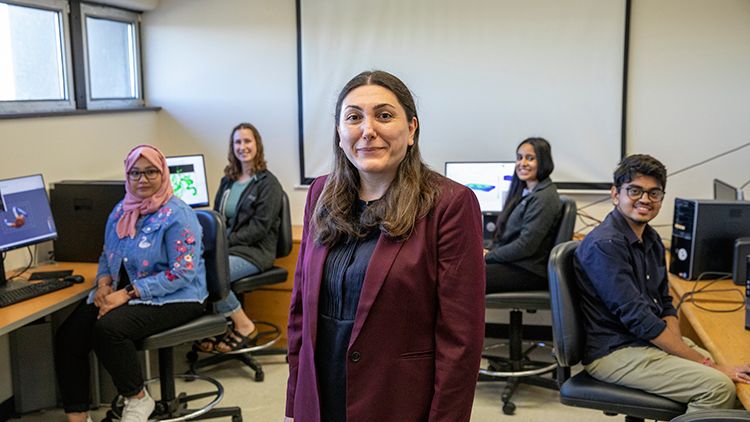MILWAUKEE — Masha Dabagh, a biomedical engineer at the University of Wisconsin-Milwaukee, has been awarded a Faculty Early Career Development award by the National Science Foundation (NSF).
Dabagh will use the five-year, $542,000 grant, often called the CAREER award, to build a virtual model of a tumor that can help reveal biomarkers of cancer formation and stages, and can also predict the likelihood of the tumor spreading. She will specifically construct a model of a prevalent type of pancreatic tumor, known as pancreatic ductal adenocarcinoma. She will seek changes that occur in the tissue on a molecular level.
With pancreatic cancer, patients rarely show physical symptoms until the disease is in a late stage or has already spread to other parts of the body.
“If we understand the cellular mechanisms of malignancy, and we track those, then we are in a good place for prevention and treatment,” Dabagh said. “I believe this model will be very helpful in increasing earlier and more accurate cancer diagnoses.”
Dabagh is an assistant professor at UWM’s College of Engineering and Applied Science and specializes in computational modeling of how cells and organelles inside of cells sense and respond to changes in their surroundings.
CAREER awards are the NSF’s most prestigious grants early career researches can receive.
Dabagh will take a comparative approach with healthy tissue and diseased tissue to find the differences between the two.
“Cancer cells move around to find the best place to grow,” Dabagh said. “Once we have a view of the changing composition, then we work backwards to find the biomarkers.”
By measuring molecular forces in 3D with atomic force microscopy, Dabagh and her team will determine the biomechanical properties of the different tissue and then feed that into their model. Different levels of tissue stiffness can show malignancy or progressive malignancy.
“We would also look for a vascular network forming around the tissue because blood vessels are needed for cancer to grow,” she said.
Her team will also track the collagen fiber, a common protein that gives structure to the tissue. In pancreatic cancer, the collagen fiber builds up, forming a thick layer around the tumor which blocks drugs from reaching the cancer cells.
The model will be personalized for patients using their biological data. This model could also help reveal progressions of different diseases and be used to tests new drugs and treatments.



